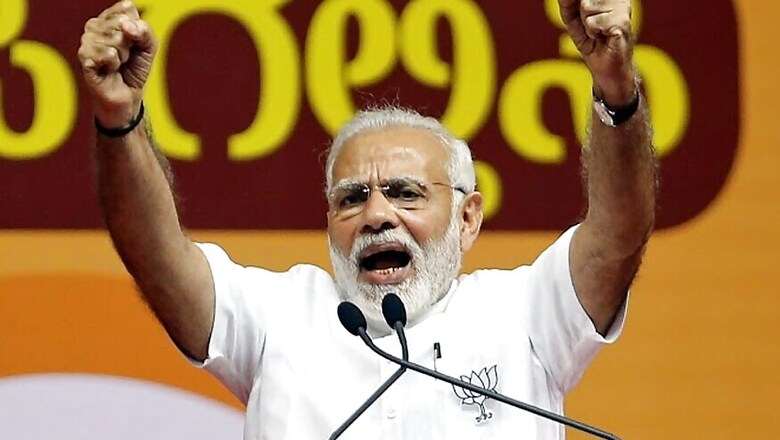
views
New Delhi: Narendra Modi's ability to influence electoral outcome in Karnataka election through sheer tenacity and rhetoric in the last lap of canvassing has no match in the current line-up of political leadership across party lines.
BJP’s election strategy, fine-tuned by the Modi-Shah duo over the last five years, can broadly be delineated into two distinct phases. Phase-I involves a long-term preparation, which starts one year before the elections are due in a state. This phase primarily involves caste mobilisation of the core BJP base coupled with disruptive measures to make inroads into the opposition vote base.
For instance, in Karnataka, BS Yeddyurappa as the BJP CM face was entrusted to rally the Lingayats and also impinge on Congress' core constituency, especially the Dalits. The former chief minister, thus, made it a point to dine at Dalit homes as he criss-crossed the state on his rath last year.
The attempt to mobilise smaller backward communities feeling alienated by dominant OBC castes in power is another crucial aspect of this strategy.
Phase II of BJP’s campaign in the last many elections revolved around Modi's 'shock and awe' tactics, involving a series of rallies, meetings and road shows in the last two weeks before the polling.
These events are generally seen to be high on optics and rhetoric aimed at dazzling the fence-sitters. The Prime Minister using a sea plane during Gujarat campaign is one such instance.
BJP’s campaign trajectory is broadly defined by the groundwork of Amit Shah and capped by PM’s rallies. By sticking to this form of build-up, culminating in a crescendo of sorts, the BJP thus far has reaped rich electoral dividends in a vast majority of the states.
However, there have been two distinct exceptions to this rule — Delhi and Bihar in their respective assembly elections in 2015.
There were a lot of similarities in the two election campaigns. The opposition in both instances was led by a strong provincial leader, pitted against the Prime Minister. The leader in question was leading a non-Congress party and had a clean image. By the end of both the campaigns, the elections had turned broadly into a bipolar contest.
Both Arvind Kejriwal and Nitish Kumar were able to convince the voters that the elections were being held to elect a Chief Minister, who would cater to local needs and not for the Prime Minister of the country.
In the build-up to the Karnataka elections, Siddaramaiah has happily played along with the BJP's attempt to make it a CM vs PM contest. He's quite consciously weaved a sub-nationalist undertone to his poll narrative. The CM has attempted to disrupt the BJP's core consolidation by giving a go-ahead to a recommendation on recognition of Lingayats as a separate religious group.
All this notwithstanding, every election is a unique exercise in socio-political-economic churning.
In the last five years, very few states have given a fractured verdict; not even Punjab last year where the contest was genuinely multi-cornered between the AAP, the Congress and the Akali Dal.
Karnataka is a high stakes battle for both BJP and the Congress and it will test Congress' ability to challenge the BJP in a direct contest. Most importantly, it will make or mar the Congress' efforts to appropriate leadership of the alternative front against the NDA in 2019.




















Comments
0 comment